Graduate Student Fellows
Congratulations to the ACES 2018 Student Fellows!
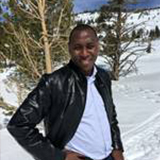
Temitope "Israel" Borokini
Israel Borokini is a PhD candidate at the University of Nevada, Reno. He is on study-leave from National Center for Genetic Resources and Biotechnology, Ibadan, Nigeria, where he coordinates the management of native plants in Nigeria. He has published several scientific articles on ethnobotany and indigenous knowledge, invasive species management, conservation policy and biodiversity conservation. His current dissertation focuses on population abundance estimation and genetics, species distribution modeling, and community diversity of federally-listed native wildflowers in the Great Basin desert, western United States.
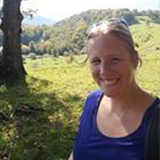
Katherine Brownson
Katherine Brownson is a Ph.D. candidate at the University of Georgia in Integrative Conservation and Ecology. Her research focuses on assessing the social and environmental impacts of incentive-based programs for improving ecosystem services provisioning, especially in productive landscapes. She is especially interested in identifying mechanisms for minimizing potential trade-offs between ecological objectives and human well-being. She conducts fieldwork in the mountains of Costa Rica and in the agricultural lands of southwest Georgia. When she isn't teaching or working on her dissertation, she enjoys gardening, hiking, playing music and trying to keep up with her toddler.
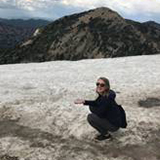
Tatiana Gladkikh
Tatiana Gladkikh is a PhD student at the University of Vermont. Her research focuses on social aspects of natural resources management and ways to promote adoption of sustainable practices. Her current project examines the links between cultural ecosystem services (CES) and people's well-being, and role of CES in shaping pro-environmental behavior.
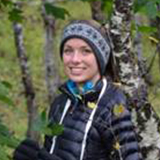
Diana Hackenburg
Diana is a PhD student in the University of Vermont’s Rubenstein School of Environment and Natural Resources. She is part of a transdisciplinary team led by Dr. Rachelle Gould examining the connections between harmful algal blooms in Lake Champlain and human well-being. She will focus on how and why communities take action, specifically looking at how they understand and use diverse forms of scientific data to inform decision-making processes and build effective community-based initiatives for water quality. Her research interests also include cultural ecosystem services, scientific communication, and socio-ecological systems. Diana is a graduate fellow with the Gund Institute of Environment and a consultant with the UVM Graduate Writing Center.
Before moving to Vermont, Diana spent time honing her communication skills as a science writer with North Carolina Sea Grant. She also has worked in land conservation in North Carolina and Virginia, and in watershed planning with the Virginia Department of Environmental Quality. Originally from Ohio, she has a BS from Marietta College, as well as a MSES and an MPA from Indiana University's School of Public and Environmental Affairs. Diana enjoys volunteering with the Five Corners Farmers’ Market, gardening, and spending time outside with her husband Jesse and dog Lucy.

Michael Johnson
Michael Kotutwa Johnson is an enrolled member of the Hopi Tribe and PhD Candidate in the School of Renewable Natural Resources and the Environment at the University of Arizona. His current research focuses on identifying the barriers preventing Indigenous people from accessing Payment for Ecosystem Service programs, highlighting contributions by Indigenous people in the area of conservation and developing policy to integrate Indigenous knowledge in the area of natural resource management. His published works include Barriers to PES programs in Indigenous Communities: A lesson in land tenure insecurity from the Hopi Indian reservation published in the journal Ecosystem Services and he is also a co-author of Hopi People of the Land: Sustaining Agriculture on the Hopi Reservation. Michael is also a traditional Hopi dryland farmer and has lectured extensively on the benefits and techniques of Hopi agriculture. Michael is the guest-curator on a exhibit entitled, The Resiliency of Hopi Agriculture: 2000 Years of Planting, now showing at Arizona State Museum in Tucson, Arizona.

Helina Jolly
Helina is a PhD student in the Institute for Resources, Environment and Sustainability; a UBC Public Scholar; Nehru Humanitarian Fellow and a Liu Scholar at the Liu Institute for Global Issues. Broadly, her research interests are ecosystem services, Indigenous rights, gender studies, biodiversity conservation and environmental policies. Her doctoral research supervised by Dr. Terre Satterfield and Dr. Milind Kandlikar will examine the implication of post-independence forest policies of India on the Adivasi-forest relationship in India. Her work will focus on the predicament of Kattunaikar people of Wayanad forests in Kerala (South India) and evaluate the ecosystem services, Adivasi security and rights (eroded or enhanced) as a function of forest policies.
She is the founder of the project ‘The Everyday Nature‘ which aims to understand the perceptions of people towards nature. Before joining RES, Helina worked in India for nearly six years on various environment and development sector projects in association with Ministry of Environment Forest and Climate Change, Government of India, Deutsche Gesellschaft für Internationale Zusammenarbeit GmbH (GIZ), Centre for Science and Environment, Clinton Climate Initiative and Ennovent.
Helina is a Commonwealth Scholar and a graduate from London School of Economics and Political Science. She is a strong advocate of women empowerment, huge foodie and loves to paint in her spare time. Contact: helinajolly.ubc@gmail.com | helinajolly@alumni.ubc.ca | LinkedIn
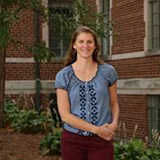
Erika Kraus
Erika Kraus is a PhD candidate at Michigan State University in East Lansing, Michigan, USA. Her research explores non-material benefits from nature under the direction of Emily Huff, PhD., in the Department of Forestry. Another setting for Erika’s research is wooded shrines in the Republic of Benin, in Sub-Saharan West Africa. Erika also enjoys teaching French, trying to remember Arabic, and working as a campus recruiter for the United States Peace Corps at Michigan State. Much of her life includes playing with her two children and watching movies with her husband.
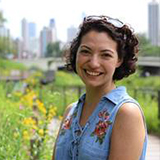
Jewel Lipps
Jewel Lipps is a Biology PhD student at Georgetown University and National Science Foundation Graduate Research Fellow. She aims to connect principles of plant population ecology to the production of ecosystem services. Prior to starting graduate school, Jewel worked on ecosystem services for contaminated site remediation as a research fellow at the Environmental Protection Agency Superfund headquarters office.
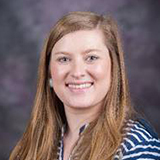
Kelsey McDonough
Kelsey McDonough is a doctoral candidate in the Department of Biological and Agricultural Engineering at Kansas State University under the supervision of Stacy Hutchinson. Her research examines spatiotemporal patterns of water resources and ecosystem services throughout the central United States. She utilizes physically based hydrologic models and remotely sensed datasets to understand the impact of anthropogenic activities and climate change on the provision of hydrologic ecosystem services. Kelsey also completed her M.S. in Biological and Agricultural Engineering at Kansas State University, where she investigated the potential for green infrastructure to enhance the provision of hydrologic ecosystem services throughout a developing watershed. Prior to attending Kansas State University, Kelsey completed her B.S. in Biological Engineering at North Carolina State University.
Kelsey is an advocate for science communication and interdisciplinary research and aims to conduct research that crosses disciplinary bounds using the ecosystem services approach. She was a member of a multidisciplinary student team that won the Environmental Protection Agency's 2016 Campus Rainworks Challenge for their application of the ecosystem services approach to mitigate urban flooding challenges in Kansas. Kelsey plans to continue her career in water resources and ecosystem service research following the completion of her doctoral degree in December 2018. She is an active member of the Young Ecosystem Service Specialists within the Ecosystem Services Partnership.
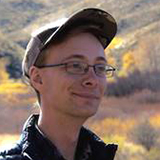
Joshua Morse
Josh is a PhD student at the Rubenstein School, where he uses interdisciplinary methods to study how natural resources are valued, and how those values are incorporated (or, not incorporated!) into policy. He is particularly interested in the interplay between quantifiable and non-quantifiable values, the different systems that are used to weigh them in decision-making, and the social and environmental justice implications of those decisions. Josh holds an MESc from Yale School of Forestry & Environmental Studies, where he studied the human dimensions of managing large mammal migrations in the Greater Yellowstone Ecosystem. He earned his BA at Oberlin College, where he majored in biology with a focus on lake trout reintroduction in the Great Lakes and also read a great deal of Robert Frost.
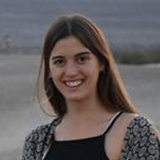
Melissa Naugle
Melissa Naugle is a master’s student at the California State University, Monterey Bay. She is currently in her first year and still developing her research project but plans to study how corals respond to temperature stress, especially at the molecular level. Melissa's passion for marine ecology and coral physiology has taken her around the world. She has studied coral conservation in Thailand, coral physiology in Western Australia, and coral-algae interactions in Palau. Her experiences have focused on better understanding how environmental stress affects corals and how we can work towards their conservation.
Prior to her graduate work, Melissa earned her Bachelor's in Environmental Science and Policy from the University of Maryland, College Park. After graduating, she began working in Gina Wimp's lab at Georgetown University in a new ecosystem: salt marshes. Her research investigates natural and anthropogenic stressors on salt marsh arthropod communities across long term temporal scales. She used a network analysis approach to study food web resilience after a natural disturbance. Melissa is excited to apply what she has learned from salt marsh food web research to her graduate work.
In addition to her research, Melissa is active in environmental education and outreach. She has worked as a naturalist at Locust Grove Nature Center for years and enjoys showing others why environmental conservation is so important. In her free time, Melissa enjoys hiking, scuba diving, and photography
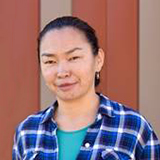
Navchaa Tugjamba
Navchaa Tugjamba is a PhD student in the Department of Geography and Planning at Macquarie University, Australia.
Her research study aims to examine the applicability of ecosystem services approach to support climate change adaption at a local scale, in case of Mongolia. Her research interests include the integration of ecosystem services into environmental management; traditional ecological knowledge: nomadic herders’ adaptation knowledge and practice; environmental education.
She obtained her BSc and MSc in Geography from Mongolian State University of Education, and MSc in Environmental Sciences from UNESCO-IHE, The Netherlands.
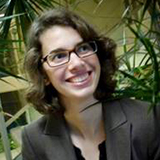
Améline Vallet
Améline Vallet is a PhD student at AgroParisTech and CIFOR under the supervision of Bruno Locatelli and Harold Levrel. Her research interests are at the intersection between economics and ecology, and cover ecosystem services modelling, ecosystem services tradeoffs as well as sustainable governance of natural resources. She has an interest in interdisciplinary research, working with ecologists, economists, social scientists and policy makers.
Her PhD specifically focuses on the societal and ecological tradeoffs occurring in Latin American landscapes regarding ecosystem service provision and governance. In Costa Rica, she analyzes landscape capacity to provide simultaneously multiple ecosystem services during societal and economic transformations. She compares different methods to quantify the tradeoffs between ecosystem services using tools from economics (production frontiers) and statistics. In Peru, she investigates stakeholders’ differentiated roles in relation to ecosystem services governance using interviews and social network analyses. This work is part of a larger project that involves the Swiss cooperation, the regional government of Apurímac (Peru) and local NGOs through a participatory research project. At AgroParisTech she teaches subjects related to ecosystem services mapping and valuation, as well as ecological engineering.


